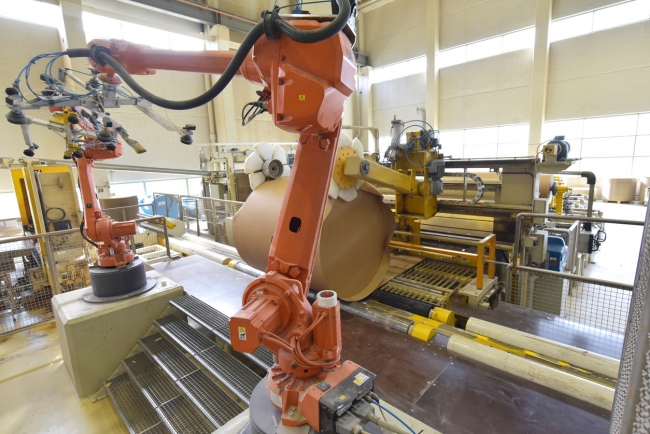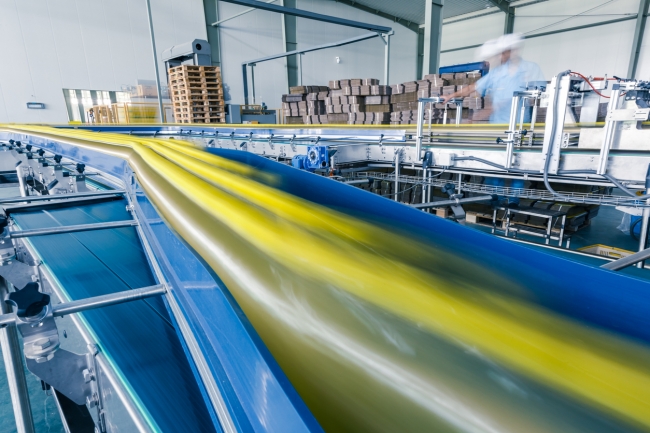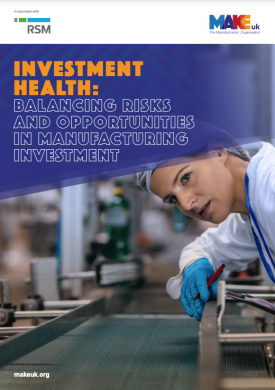4 minute read with link to full report
Survey shows Britain’s manufacturers are set to ramp up investments
Britain’s manufacturers are set to ramp up their investment with a focus on boosting skills, net zero and R&D, according to a new survey published by Make UK and RSM UK.
The survey also shows that while manufacturers support the decision to make the annual investment allowance permanent, a measure overwhelmingly backed to boost investment, the majority of manufacturers believe that the increase in the level of corporation tax announced on Friday 14 October will make the UK less attractive as a destination for foreign investment.
According to Make UK’s analysis of official data, manufacturing investment still remains 3% below the last pre-pandemic year in 2019. While there are now clearly greater downside risks in the light of current market and business sentiment, the survey shows manufacturers see increasing investment as mission critical to tackling supply chain disruption, labour shortages and increased energy costs, as well as improving productivity. Increased manufacturing investment will also help drive overall total business investment which is key to the government’s aim of improving the trend rate of economic growth.

60% of British manufacturers are planning to increase investment in the next two years, according to a recent sector survey / Picture: Getty/iStock
Encouragingly, the survey also revealed that overall, average investment in plant and machinery as a share of turnover has increased over the last five years. However, the survey shows that there is a clear difference between average share of turnover invested by UK firms compared to foreign owned firms with UK subsidiaries. According to Make UK, this could suggest that the UK plants have become a less favourable location for foreign companies with other locations.
Furthermore, the survey also showed that the cost of inflation is likely to act as a drag on investment by reducing the rates of return, while the prospect of significantly higher base rates will deter companies who may have built up substantial amounts of debt during the pandemic.
Fhaheen Khan, senior economist at Make UK, said: “Despite becoming increasingly digitalised, manufacturing remains a capital-intensive sector that must invest continuously to grow, innovate and remain internationally competitive. However, it’s clear that investment has not accelerated at the pace it needs to for some time.
“While the pandemic has clearly stopped some investment in its tracks and, despite current uncertainty, manufacturers recognise that upping their investment is fundamental to securing their future. If we are serious about boosting growth and improving productivity, then a step change in the UK’s business investment must be at the heart of government policy. This must start with providing economic and political stability, as well as carefully designed and targeted incentives which properly reflect the life cycle of manufacturing investment.”
Mike Thornton, national head of manufacturing at RSM UK, added: “The UK economy needs a buoyant manufacturing sector that continues to make investments in capital to improve productivity and compete on the global stage. With just nine per cent of manufacturers confirming government support even factored into their decision-making process regarding investment, there is clearly a huge opportunity for policymakers to do more in the future. More generous and accessible incentives and, more time to make use of them, would be welcomed by business leaders across the industry.”

Make UK says the survey shows that boosting investment is seen as mission critical in addressing skills shortages, supply chain disruption and energy costs / Picture: Getty/iStock
According to the survey, six in 10 manufacturers are planning to increase investment in the next two years. The overall priorities for companies’ investment plans are in skills (69%), capital (55%) and R&D (40%).
The specific challenges of the last few years are also factors in incentivising more investment with the need to address skills shortages cited by almost half of companies (48%), along with reducing supply chain disruption (44%) and, reducing energy bills (40%).
The survey shows that net zero remains a significant priority for companies with almost two thirds of companies (62%) planning to increase investment in capital to reduce carbon emissions, over half (55%) to increase capital to improve processes and over four fifths (43%) increasing investment in low carbon technologies.
By contrast, the factors likely to prove a barrier to increased investment by companies are a rise in inflation (37%) and increased interest rates (22%). Given the likelihood of both these increasing, the survey makes clear that companies will face significant hurdles to realising their investment ambitions.
To counter these potential barriers, it will be essential that government taxation policy supports investment with incentives which are properly designed to fit with the life cycle of manufacturers’ investments and, aligned with the UK being seen as an attractive overall destination for investment.
The survey (conducted before the recent announcements by former chancellor Kwasi Kwarteng) backs two of his announcements. Two thirds of companies believed increasing the rate of corporation tax to 25% would have made the UK less attractive for foreign investment, over half (57%) said it would result in manufacturers investing less capital, while a third said it would wipe out the benefits from capital allowances.
Furthermore, making the annual investment allowance (AIA) permanent at £1m was the most favoured investment incentive for a third of companies (32%). Conversely, if the allowance had not been made permanent and the threshold of £1m had been reversed to just £200k, a third of companies (34%) said it would have reduced their investment in plant and machinery.
Outside of the AIA, a quarter of companies (26%) would support the introduction of full expensing (100% capital allowance), while the same proportion would support a two year extension of the super-deduction scheme.
